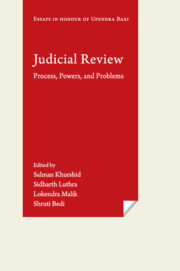Book contents
- Frontmatter
- Contents
- Foreword
- Editors' Note
- Introduction
- 1 The Inadequacy of Judicial Enforcement of Constitutional Rights Provisions to Rectify Economic Inequality, and the Inevitability of the Attempt
- 2 The Interplay of Law and Politics in India
- 3 Beating the Backlog: Reforms in Administration of Justice in India
- 4 Judicial Review: Perspectives and Reflections for the Twenty-First Century
- 5 When ‘Creeping Jurisdiction’ Goes Awry: The Social Action Litigation to Ban Surrogacy
- 6 Judicial Review and the Democratic Judge
- 7 Judicial Review: A Tool to Shape Constitutional Jurisprudence
- 8 The Baxian Bioscope on Indian Judicial Process
- 9 Judicial Activism, Courts, and Constitutional Revolutions: The Israeli Case
- 10 Democracy, Constitution, and Judicial Review: A Critique
- 11 A Minor Jurisprudence of Pathos: Upendra Baxi as Teacher and Writer
- 12 The Need for Reinventing the Supreme Court as a Constitutional Court
- 13 Appointment of ‘Distinguished Jurists’ as Judges in the Supreme Court of India: A Critical Analysis
- 14 Judicial Dissent and Judicial Review: A Functional Analysis
- 15 The Power of Judicial Review: Judicial Chutzpah or Judicial Desideratum
- 16 Judicial Review of Legislations by Tribunals in India: Law, Problems, and Perspectives
- 17 Criminalization of Membership of Terrorist Organizations in India and the United States of America: Human Rights Concerns
- 18 Article 142 of the Indian Constitution: On the Thin Line between Judicial Activism and Restraint
- 19 Sketching the Limits of Article 142 of the Constitution of India: A Constitutional Necessity
- 20 Constitutional Morality and Judges of the Supreme Court
- About the Contributors
- Index
15 - The Power of Judicial Review: Judicial Chutzpah or Judicial Desideratum
Published online by Cambridge University Press: 23 January 2020
- Frontmatter
- Contents
- Foreword
- Editors' Note
- Introduction
- 1 The Inadequacy of Judicial Enforcement of Constitutional Rights Provisions to Rectify Economic Inequality, and the Inevitability of the Attempt
- 2 The Interplay of Law and Politics in India
- 3 Beating the Backlog: Reforms in Administration of Justice in India
- 4 Judicial Review: Perspectives and Reflections for the Twenty-First Century
- 5 When ‘Creeping Jurisdiction’ Goes Awry: The Social Action Litigation to Ban Surrogacy
- 6 Judicial Review and the Democratic Judge
- 7 Judicial Review: A Tool to Shape Constitutional Jurisprudence
- 8 The Baxian Bioscope on Indian Judicial Process
- 9 Judicial Activism, Courts, and Constitutional Revolutions: The Israeli Case
- 10 Democracy, Constitution, and Judicial Review: A Critique
- 11 A Minor Jurisprudence of Pathos: Upendra Baxi as Teacher and Writer
- 12 The Need for Reinventing the Supreme Court as a Constitutional Court
- 13 Appointment of ‘Distinguished Jurists’ as Judges in the Supreme Court of India: A Critical Analysis
- 14 Judicial Dissent and Judicial Review: A Functional Analysis
- 15 The Power of Judicial Review: Judicial Chutzpah or Judicial Desideratum
- 16 Judicial Review of Legislations by Tribunals in India: Law, Problems, and Perspectives
- 17 Criminalization of Membership of Terrorist Organizations in India and the United States of America: Human Rights Concerns
- 18 Article 142 of the Indian Constitution: On the Thin Line between Judicial Activism and Restraint
- 19 Sketching the Limits of Article 142 of the Constitution of India: A Constitutional Necessity
- 20 Constitutional Morality and Judges of the Supreme Court
- About the Contributors
- Index
Summary
The Supreme Court of India earned the title of ‘the strongest court of the world’. One important reason for this is the spectacular development of the law on judicial review by the court. The path was not easy, and the acceptability of judicial review under the Indian Constitution was not as it is today. Dealing with a very specific and detailed Constitution, the Indian Supreme Court thus began with a disadvantage. It has struggled hard to retain and protect the power of judicial review. Golak Nath and Kesavananda both were assertions of the finality of the decision-making power by the court against parliament.
The term ‘judicial review’ does not find specific mention in the Constitution. However, in the Constitution of India, the power has been bestowed upon the judiciary under articles 13, 226/227, and articles 32 and 131–136, and so on. The legitimacy of judicial review has never been an issue. Although article 13(2) of the Indian Constitution specifically provides that a law inconsistent with the fundamental rights guaranteed by Part III is void, the Indian Supreme Court made it clear in one of the earliest cases that the power of judicial review is inherent in a written constitution and exists independently of article 13(2).
The Supreme Court of India, the final arbiter of the rights of the people, has the responsibility of interpreting and protecting the Constitution. Judicial review literally means the revision of the decree or sentence of an inferior court by a superior court. In countries that have a written constitution, the courts also have the power to test the validity of legislative and governmental actions with reference to the constitution. Any legislative action or executive order can be declared unconstitutional if it is found to be violative of the provisions of the constitution. Though in reality, as enunciated by D. D. Basu, unconstitutionality is nothing but a projection of the doctrine of ultra vires from the sphere of statute law to that of constitutional law. The constitution operates as a higher law as compared to the ordinary laws. Consequently, any act, whether administrative or legislative, which transgresses the mandate of this higher law becomes unconstitutional. Since the executive and legislature are limited and controlled by the boundaries set by the constitution, their acts become unconstitutional and invalid when they contravene the constitution.
- Type
- Chapter
- Information
- Judicial Review , pp. 277 - 292Publisher: Cambridge University PressPrint publication year: 2020

